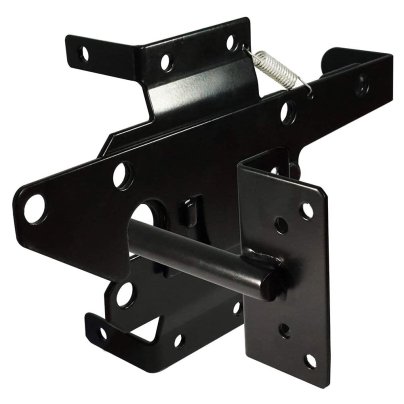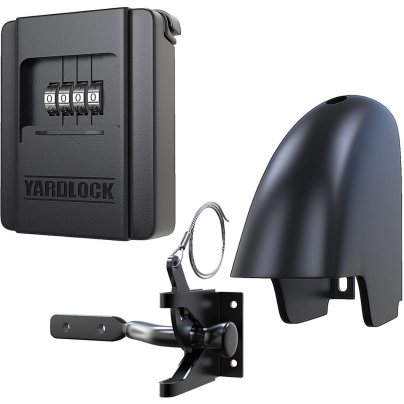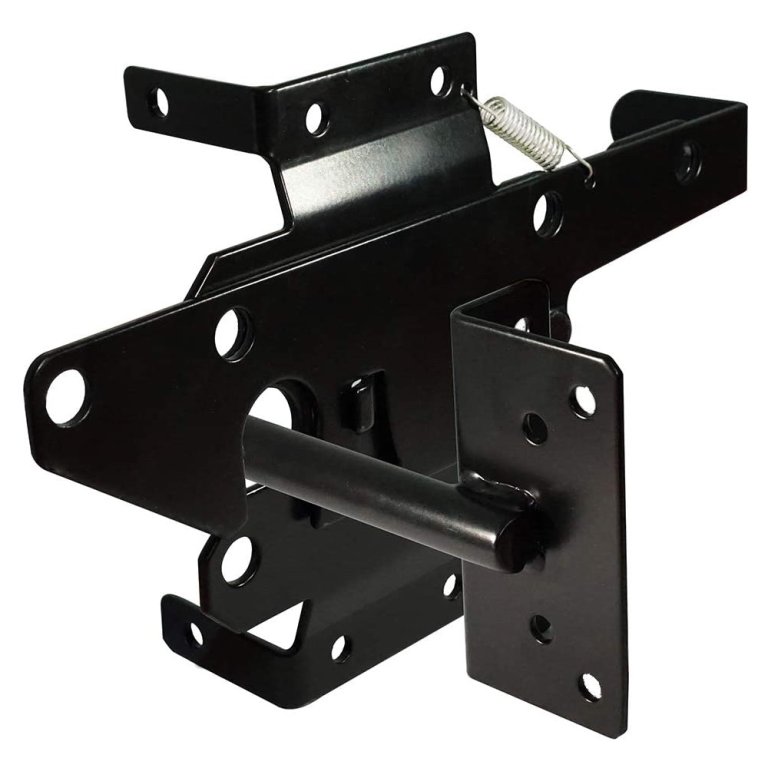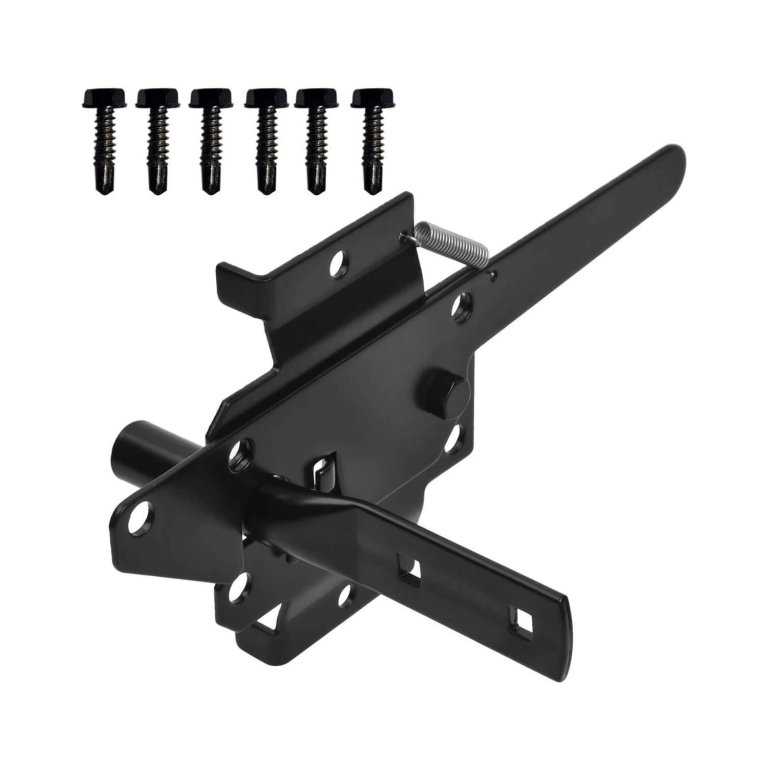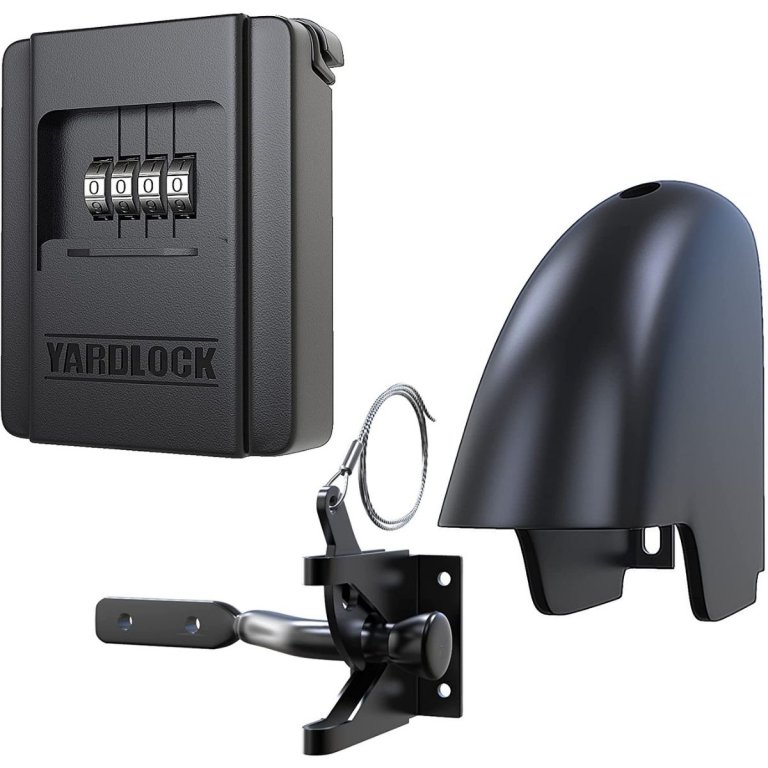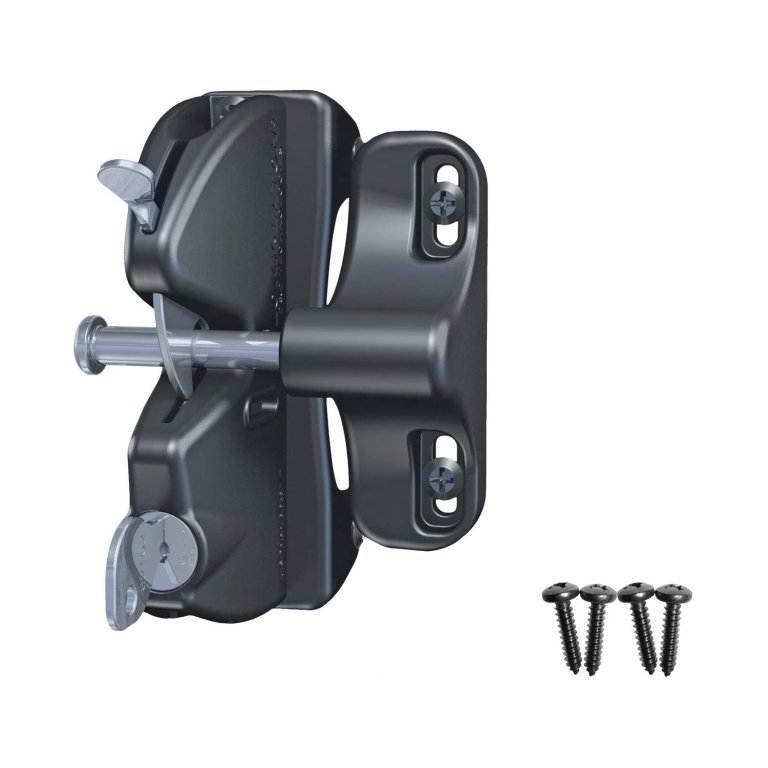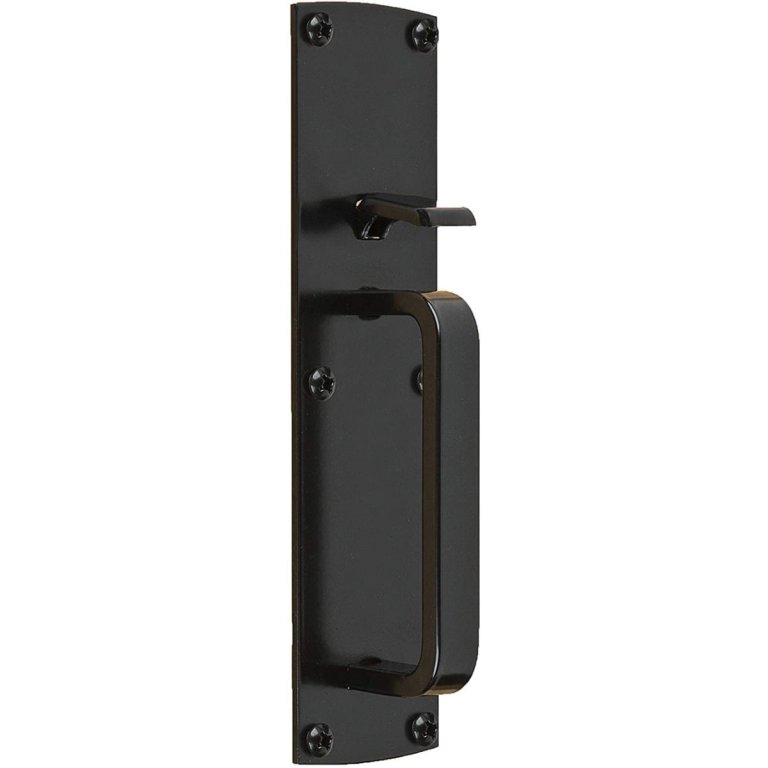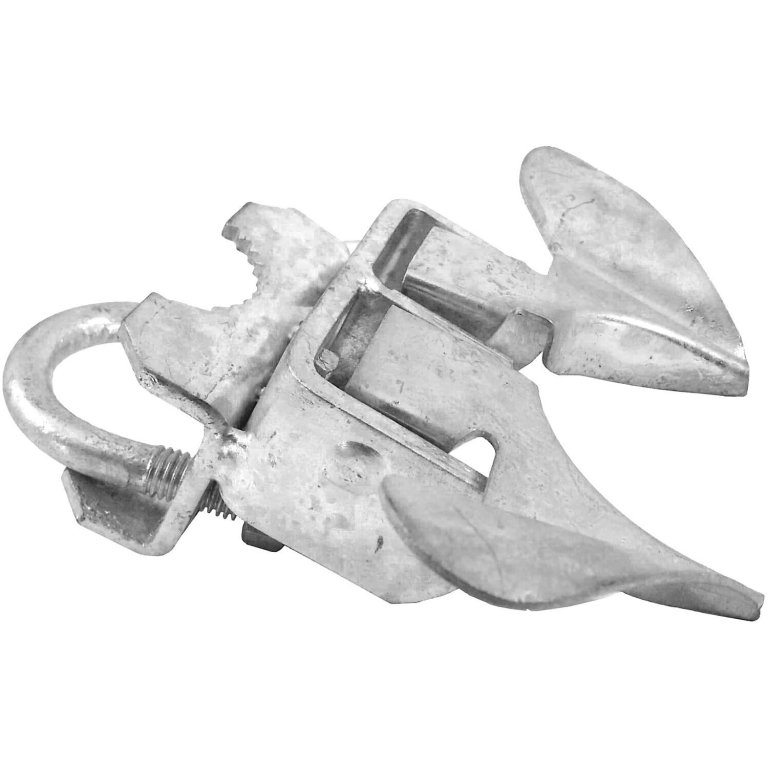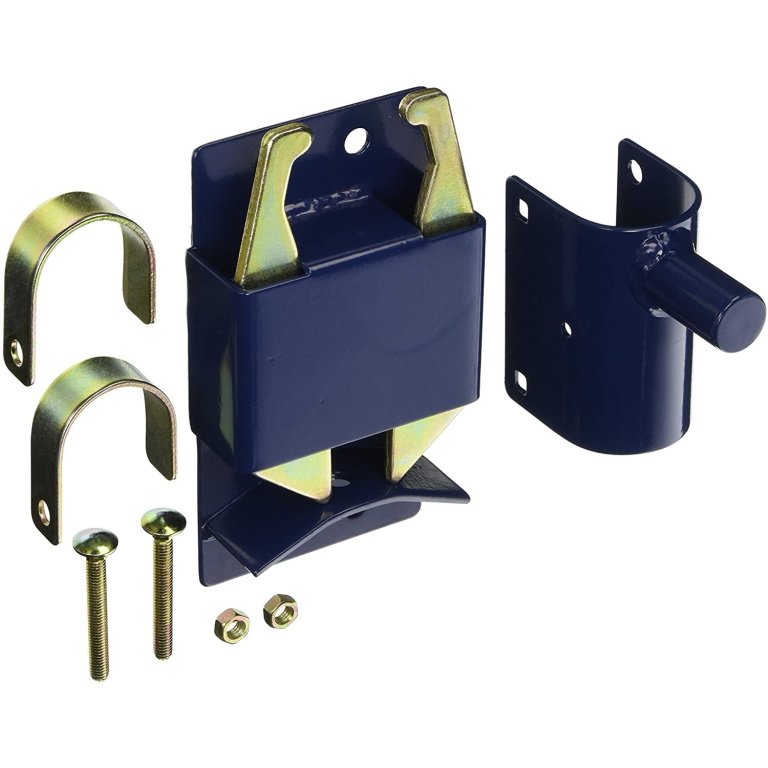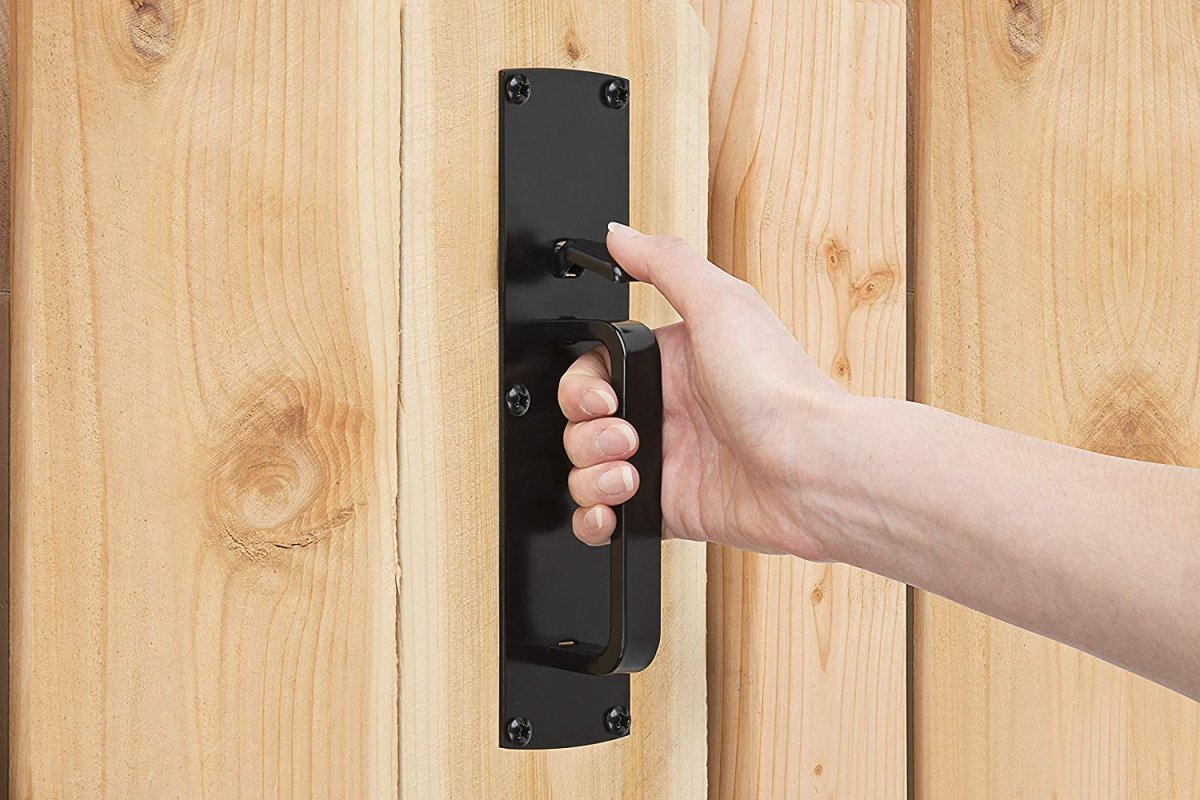
We may earn revenue from the products available on this page and participate in affiliate programs. Learn More ›
Installing a fence, whether it’s wooden, PVC, or metal, is a great way to secure your yard and maximize privacy. Bonus: It’s usually DIY-friendly. But one thing that many DIYers fail to realize is that their fence is only as secure or functional as the gate latch.
For those looking to get the most security and function possible from their fence, only the best gate latch will do. These devices keep the gate shut while allowing the residents to pass through with relative ease (after unlocking, of course). With that in mind, read on to learn more about choosing the best gate latch for your fence.
- BEST OVERALL: Sankins Self-Locking Heavy-Duty Post Mount Gate Latch
- BEST BANG FOR THE BUCK: Aiwaiufu Post Mount Gate Latch
- UPGRADE PICK: Yardlock Keyless Gate Lock
- BEST FINGERTIP: D&D Technologies LokkLatch Locking Gate Gravity Latch
- BEST THUMB LATCH: National Hardware Gate Thumb Latch
- BEST FOR CHAIN-LINK GATES: Jake Sales Wall Mount Butterfly Gate Latch
- BEST FOR LARGE GATES: Speeco Products 2Way Gate Latch
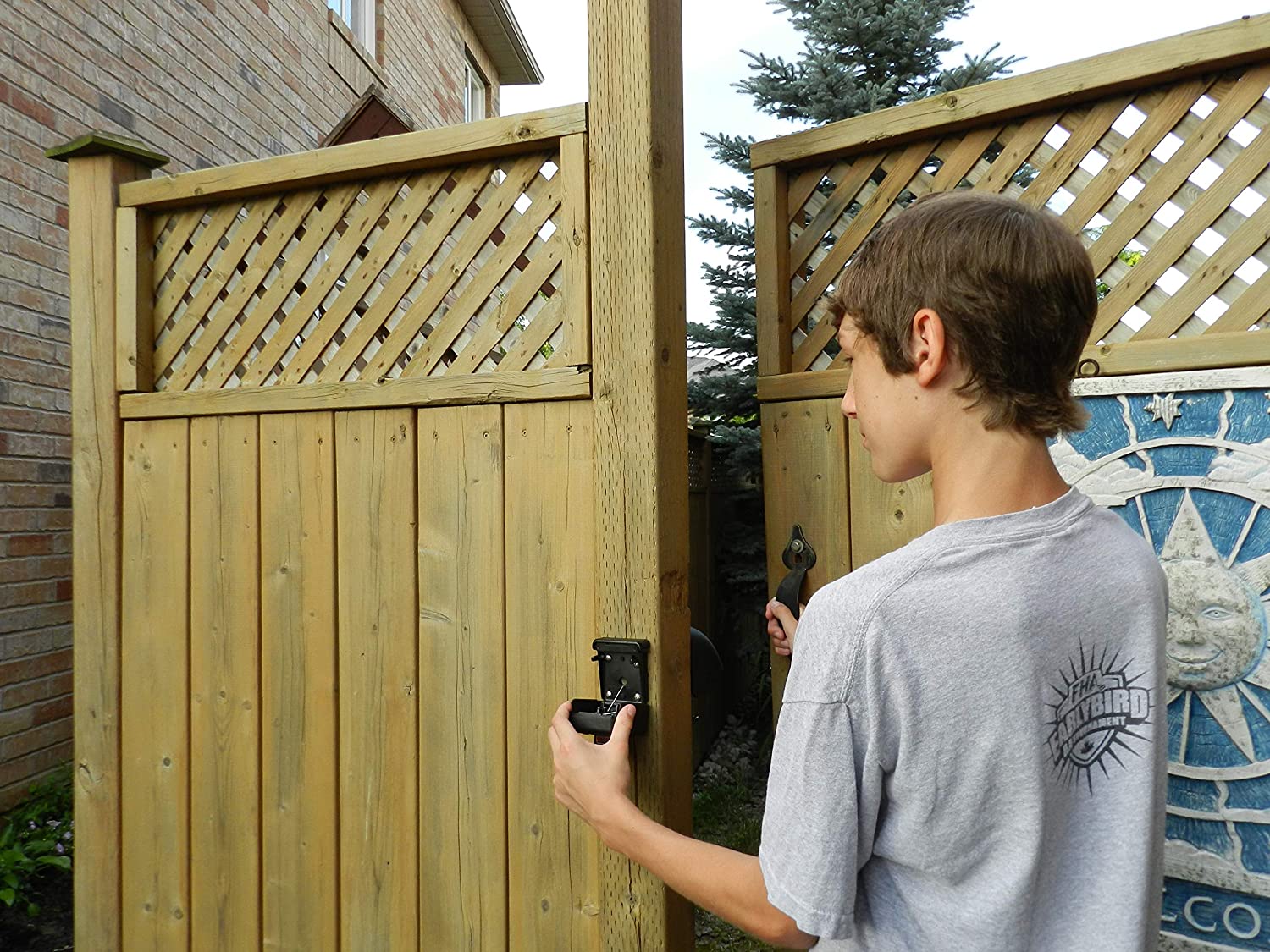
How We Chose the Best Gate Latches
With such a wide range of products to choose from in the gate latch market, we did our research to gather a list of recommendations across a range of categories. All of our top picks are made from durable materials and are relatively easy to install. Depending on what shoppers are looking for, our list provides options for fingertip latches, thumb latches, combination locks, and a simple yet effective latch for chain link fences.
Our recommended models represent the best the market has to offer in terms of ease of use, durability of materials, and simplicity of installation. They’re all relatively budget-friendly, too.
Our Top Picks
Here are some of the most popular gate latches on the market, organized by the most-looked-for categories. Read on for some of the best heavy-duty, light-duty, garden, and fence gate latches available today.
Best Overall
Sankins Self-Locking Heavy-Duty Post Mount Gate Latch
Pros
- Easy to install; comes with coated gate hardware and built-in brackets
- Can be padlocked for added security and peace of mind in backyards with children and pets
- Durable steel construction is suitable for long-term use
Cons
- Limited adjustability compared with some other options on the market
Product Specs
- Type: Fingertip release
- Material: Steel
- Adjustability: None
DIYers looking to add both security and functionality to their fence gate will want to check out the self-locking heavy-duty post mount gate latch from Sankins. This model has a gravity and spring-loaded mechanism that automatically latches shut when the gate closes, providing peace of mind for yards with children and pets. There is an eyelet that a user can pass a lock through for the most security, keeping the gate securely latched.
This gate latch is powder-coated steel and features coated hardware for durability and weather resistance. It also installs easily, as it features built-in brackets for registering against the post and gate perfectly. Also, the 3.5-inch pin offers some degree of adjustability during extreme weather changes.
Get the Sankins gate latch at Amazon.
Best Bang for the Buck
Aiwaiufu Post Mount Gate Latch
Pros
- Affordable compared with some other models on this list
- Simple yet effective mechanism provides security in backyards, commercial spaces, and more
- Can add a padlock for peace of mind in backyards, commercial spaces, or sheds
- All installation hardware included for ease of installation
Cons
- Some users have reported that the hardware is a little tricky to use
- Pressed design is not tamper-proof; could bend or break with enough force
Product Specs
- Type: Fingertip release
- Material: Steel
- Adjustability: None
Anyone hunting for a self-latching post mount gate latch at a reasonable price will want to give this model from Aiwaiufu some consideration. This budget-friendly latch features a spring-loaded gravity latch that secures the gate automatically. It also has a fingertip release, allowing for easy but secure opening and closing.
This self-latching option features a powder-coated steel design that will resist the ill effects of the elements. It also features an eyelet to receive a combination lock or a padlock for more security. Just beware that the pin features a pressed design, which is less resistant against force or bending than other models featuring welded construction.
Get the Aiwaiufu gate latch at Amazon.
Upgrade Pick
Yardlock Keyless Gate Lock
Pros
- Very secure construction for ample security; combination lock integrated
- No rusting or freezing, making it suitable for all-season and long-term use
- Great for wood or vinyl gate varieties
Cons
- May be tricky for some users to install and may take more than one set of hands
- Not suitable for metal gates or posts
Product Specs
- Type: Combination lock with fingertip release
- Material: Zinc and composite
- Adjustability: None
For the ultimate in convenience and security, be sure to check out Yardlock’s keyless gate lock. This fingertip-release latch features a combination lock on the outside, allowing users to unlock their gates from either side. Simply enter the code and pull down on the lockbox; there’s a steel cable attached that lifts the latch on the other side, providing secure access. There is also a shroud that covers the cable on the inside to prevent nefarious characters from defeating the lock.
The Yardlock keyless gate lock features powder-coated steel for the latch, while the combination lock is a mix of composite materials and zinc, providing years of weather resistance.
Get the Yardlock gate lock at Amazon or Lee Valley.
Best Fingertip
D&D Technologies LokkLatch Locking Gate Gravity Latch
Pros
- Compact unit does not take up a lot of space on a fence gate, garden gate, or other gate variety
- Can be locked with a key to provide extra security in homes with children and pets
- Bolt can adjust slightly if gate slumps
Cons
- Polymer materials are less durable than steel
Product Specs
- Type: Fingertip release
- Material: Polymer and stainless steel
- Adjustability: Bolt can slide up or down a few millimeters
When it comes to convenience, it’s hard to find something to beat D&D Technologies’ LokkLatch gate latch. This latch features a simple fingertip release as well as a keyed tumbler, making passage an easy, straightforward proposition. It installs just as easily, requiring just a few screws.
The LokkLatch features industrial-strength polymers, allowing it to resist rust and corrosion for long-lasting use. If the weather affects the gate, though, this lock has both vertical and horizontal adjustability. Simply loosen the set screws from the base and adjust it according to how much the gate sagged or moved.
Get the D&D gate latch at Amazon or Gate Hardware Center.
Best Thumb Latch
National Hardware Gate Thumb Latch
Pros
- Stylish and convenient construction makes it easier to use than some comparable options
- Large handle is easy to operate and is suitable for frequent traffic
- Works with left- and right-handed gates for added convenience and versatility
Cons
- Back plate is quite large and bulky, so it may not be ideal for some users’ preferences
Product Specs
- Type: Thumb latch
- Material: Plated steel
- Adjustability: None
For an age-old, timeless look, check out the gate thumb latch from National Hardware Store. This model features a simple thumb-activated design, with the handle on the outside and the latching lever on the inside—a classic design.
This powder-coated gate latch will hold up to the rigors of outdoor exposure, providing years of use. Installation is relatively simple, as the long lever provides a bit of wiggle room when locating the catch. It’s suitable for gates between 1 and 3 inches thick. However, there isn’t an effective way to lock this latch, so adding a gate lock might be a wise idea.
Get the National Hardware gate latch at Amazon or Lowe’s.
Best for Chain-Link Gates
Jake Sales Wall Mount Butterfly Gate Latch
Pros
- Very quick installation compared to that of some other gate latches on the market
- Durable galvanized steel construction is ideal for long-term use
- Padlock can be added for improved security if desired
- 2 latches integrated to allow the gate to swing inward or outward
Cons
- Does not fit thicker pipes; may not be ideal for some users’ needs
Product Specs
- Type: Butterfly latch
- Material: Galvanized steel
- Adjustability: Easily adjusts up and down as needed
Gates in chain-link fences require specially designed gate latches like this model from Jake Sales. This latch attaches in seconds, requiring just tightening the nuts on the U-bolt to hold it in place.
This latch features galvanized steel construction, allowing it to withstand weather and outdoor exposure. There are two latches, allowing the gate to swing inward or out, depending on the situation. While these latches aren’t automatic, they do latch using gravity. For those who would prefer to keep their chain-link fence locked, there’s an eyelet underneath the unit to slide a pad or a combination lock through to keep the latches from moving.
Get the Jake Sales gate latch at Amazon.
Best for Large Gates
Speeco Products 2Way Gate Latch
Pros
- Simple installation relative to other gate latches available
- Great for livestock gates or rural areas and made to attach to pipe-framed gates
- 2-way design can be pulled inward or pushed outward
Cons
- Limited size information available
Product Specs
- Type: 2-way fingertip release
- Material: Metal
- Adjustability: Bolt is easily adjusted
Large, heavy gates have a way of wearing through normal hardware. For large livestock fences or vehicle yards, the Speeco Products gate latch might be the way to go. This model features robust construction, with thick powder-coated steel and zinc-plated hardware.
This gate latch is designed to attach to pipe-framed gates, though it can adapt to square materials. The two-way design allows users to push the gate in or pull it outward, allowing livestock or vehicles to move naturally without backing up or getting in the way. There is also an eyelet to attach a combination lock or a padlock, keeping the latch from opening until the lock is removed.
Get the Speeco gate latch at Amazon or SIM Supply.
Jump to Our Top Picks
What to Consider When Choosing a Gate Latch
Shopping for a gate latch is easy—once you’ve done your research, that is. To help you out, the following is a collection of the necessary need-to-know information. Here are some of the most important points to keep in mind while shopping for the best gate latch for your fenced-in yard.
Types of Gate Latches
There are many types of gate latches, each of which works differently while serving the same purpose: to keep the gate secure and closed. Here’s a rundown of the most common types:
- Thumb latches feature a traditional style handle with a thumb-activated push button. The handle typically mounts on the outswing side of the gate. If they lock, they usually lock with a key like a traditional doorknob.
- Ring and lever-style gate latches are pretty old-school, but they can add a nice touch to a rustic garden. Ring-and-lever latches feature a ring that’s attached to the end of a lever. When the user lifts and twists the ring, the other side of the lever lifts, clearing the catch that holds it in place. These gate latches rarely lock.
- Bolt latches operate by sliding a bolt-like latch into a catch. These gate latches are very common and are easy to lock with a padlock.
- Fingertip release models have post-mounted latches that either operate with gravity or a spring; finger release latches catch the pin and hold it in place so the gate stays shut. To open, push the top of the catch open to release the pin. These models typically lock with a padlock, but there are models with key-controlled tumblers as well.
- Butterfly latch consists of two metal plates, shaped like butterfly wings, that interlock when the gate is closed. This latch provides a strong and reliable way to keep the gate securely shut, preventing unauthorized access and ensuring the gate remains in place even in windy conditions.
Material
Gate latches are available in several different materials. The most common material used for gate latches is powder-coated steel, which is a low-cost but relatively weather-resistant choice. You’ll also find zinc-plated steel or iron, which is usually found in chain-link fence gates. Upgraded hardware options might include stainless steel or even bronze, both of which are more resistant to corrosion than steel or iron.
The different materials aren’t just for weather resistance. Many shoppers also choose a particular set of hardware (the gate latch, hinges, and the screws to mount them) for a certain look or aesthetic.
Gate Frame Shape and Type
Fences and the gates that secure them come in a variety of shapes and sizes. For example, tall fences might benefit from a particular latch style, while lower fences might do better with another. Also, some garden gates are built from wood, which features right angles and flat surfaces. Chain-link fences, on the other hand, use round metal pipes. The hardware for one won’t work for the other, so you’ll have to choose the appropriate latch for your gate.
Also, consider that some gates are actually two swinging doors that meet in the middle. The hardware for these gates needs to offer a way to latch the two sections together.
Security
If security is a concern, consider buying a gate latch that includes a lock or at least a method to attach a padlock.
The simplest models (which are typically bolt-style) provide an eyelet that the user can slide a padlock through, holding the bolt in place. More advanced designs can include built-in combination locks, allowing users to punch in a code and unlock the gate from the outside. Some other models may feature keyed tumblers—similar to those found in standard locksets.
Do keep in mind that the majority of the security a fence can offer comes from its height, so the most advanced model might not necessarily be the best gate latch for your fence.
Easy Installation
Some gate latches are easier to install than others, and choosing the correct model might hinge a bit on that point. For instance, bolt latches tend to be very easy to install: Just attach the bolt housing to the post-edge of the gate, close the gate, and install the catch that receives the bolt on the gate. In general, this takes six screws.
Other models, such as thumb-activated latches or latches with built-in combination locks, require the user to drill through the gate and align the hardware properly on both sides of the fence. Most of these kits come with templates to follow for easy installation, but it’s worth noting that the process of installing these locks may require more than one set of hands.
Adjustability
Whether a fence is wood, metal, or PVC, it’s likely to shift a bit between the seasons and temperature changes. Also, as a gate ages it will likely sag a bit. For that reason, the best gate latch for a particular application might include a degree of adjustability.
Some gate locks offer both vertical and horizontal adjustments, and they can really come in handy as a gate ages. For instance, as the gate sags and the pin drops, users can loosen a few set screws and lower the latch itself without removing the entire hardware set from the post and drilling new holes.
Tips for Choosing the Best Gate Latch
Not all gate-latch hardware is rated for outdoor application. Raw metals like steel will rust and corrode, and they’ll only last a season or two. It’s important to find hardware made from materials that will last, like stainless steel or bronze, or metals with protective coatings such as zinc plating or powder-coat paint.
When you’re shopping for the best gate latch, be sure to keep the other gate hardware in mind. You’ll want something that matches the look and feel of the hinges and any decorative bracketry. Match black hardware to black latches, and bronze or antique hinges to similarly aged latches.
Use two-way latches for large gates, such as those used for livestock or moving vehicles and trailers. These latches allow the gate to open inward or outward, allowing for more flexibility.
- Choose outdoor-rated latches for optimal weather resistance.
- Match the latch hardware to the gate hinges and brackets.
- For large gates used for livestock or vehicles, consider using a two-way latch that allows the gate to open inward or outward.
FAQs
Even with all that background on the best gate latches, there might be some new questions popping up. The following section aims to answer those queries, as it’s a collection of some of the most frequently asked questions about gate latches.
Q. Can all gates use gate latches?
Yes, all gates can use a gate latch, but not all gate latches work on all gates. Some require specific designs.
Q. How do I install a gate latch?
The easiest way to install a gate latch is by attaching the hardware to the gate first, lining the closed gate up with the post, and attaching the catch on the post. All it takes is a pencil for marking the holes to drill, a power drill and drill bits, as well as a screwdriver or driver bit for the power drill.
Q. What side should a gate open?
Typically, gates should open inward toward the space. This is a tradition held over from gardens in populated cities, where outward swinging gates could strike a passerby.
